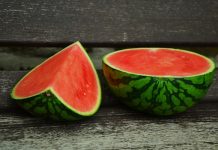
I’ve read a couple of the Q&A articles under Ask the Dietitian® and noted your concerns on low-carbohydrate diets. You are probably familiar with the Atkins diet. My wife is currently on this diet (2 weeks now) and has lost approximately 10 pounds. I guess the idea is that the carbohydrates are kept under 20 grams/day initially, while protein & fat are essentially unlimited, no calorie count restriction. This being the case, do the concerns that accompany a low carbohydrate/ low-calorie diet apply also to a low carbohydrate diet with unlimited protein?
You mention low carbohydrate diets of fewer than 900 calories not providing enough protein for muscles and organs and not supplying an adequate resource for glucose. What about 20 grams/day of carbohydrates and, say, 500 grams/day protein and 30 grams/day of fat, for example. Does this supply enough protein for adequate glucose production & protein reserve?
I don’t think all the weight my wife lost was water. She has been consuming approximately 2000 calories/day total, limiting the carbohydrates to 20 grams max and not really watching anything else. Is she headed for trouble or is the high protein/fat intake compensating for the missing carbohydrate?
If she were to transition from a carbohydrate-restricted diet to a fat-restricted diet at a later time, would this prevent regaining weight?
Yes, the concerns are the same when restricting carbohydrates whether or not you have unlimited protein or fat in your diet.
Your wife is in ketosis because of restricting carbohydrates. Your body can scavenge from food protein and fat to supply glucose. But the hoops your body has to jump through to do that requires more effort than depleting your body’s stores of glycogen.
Glycogen stored in your liver and muscles is converted to glucose rather easily. The problem is when you’ve depleted your stores of glycogen your body turns to break down (catabolize) lean tissue (muscles or organs) and food protein/fat to provide glucose to supply your body’s energy needs. When this happens, your basal metabolic rate (BMR) drops because you have less lean muscle tissue burning calories and your body thinks its starving so it lowers your metabolism so that you don’t perish. The human body’s genetic material is thousands of years old and still works in terms of feast or famine like a cave person.
A + or -25-year-old female needs 50 grams of protein per day. Protein is used to build and repair lean muscle tissue. This would not provide enough glucose to prevent ketosis in a low carbohydrate diet. A diet with 500 grams of protein per day would be equal to 71.4 ounces (4.5 pounds) of lean meat, fish or poultry. Do you really think your wife can eat that much? (Did you mean 50 grams?) Also, since most sources of protein also have fat, I would guess that a diet that included 500 grams of protein would also inherently contain at least 214 grams of fat assuming she only ate lean meats like fish and poultry. (One ounce of lean meat, fish or poultry has 7 grams of protein and 3 grams of fat.) A diet high in protein usually turns off the appetite (as do the ketones being produced) and makes the kidney do more work to excrete the nitrogen byproducts of breaking down protein to scavenge the glucose part for fuel. Proteins are large molecules and your blood is constantly filtered by your kidneys.
Twenty grams of carbohydrate is only 80 calories. If the remaining calories are protein and fat, she could be eating 4.5 pounds of lean meat a day based on your estimates. Is this possible?
I would bet that a lot of the weight your wife has lost is water because 1 gram of glycogen in muscles and lean tissue holds 3 grams of water. When you deplete glycogen, you lose the water it was holding. Muscles and lean tissue are 70% water; fat is only 15% water. Do you understand why your wife is losing a lot of water? Little glycogen left to hold water in muscle. Usually, these low carbohydrate diets encourage 8 glasses of water per day. BTW there is no research to support drinking 8 glasses or any specific amount of water per day which amount differs for each person. This is to help flush the ketones out of the body through the kidneys and to prevent dehydration. One method of determining if you are dehydrated is to grab a pinch of skin on the back of your hand (turgor) and let go. If your skin snaps back flat, you probably are not dehydrated. Also, look at the color of your urine. During the day it should be light yellow and odorless unless you take vitamin C supplements which will turn your urine yellow.
Look at how much space 10 pounds of butter takes up in the grocery store. Does your wife think she has lost that much fat in two weeks? Probably not.
What is your wife going to eat when she goes off her low carbohydrate diet? When she starts to eat a low-fat diet, she will experience weight gain just due to re-hydration and restore liver/muscle tissue glycogen.
A weight loss plan that is more like her normal eating habits with fewer calories and moderate fat with a regular exercise program has been shown to be the most successful at keeping weight off long term.



